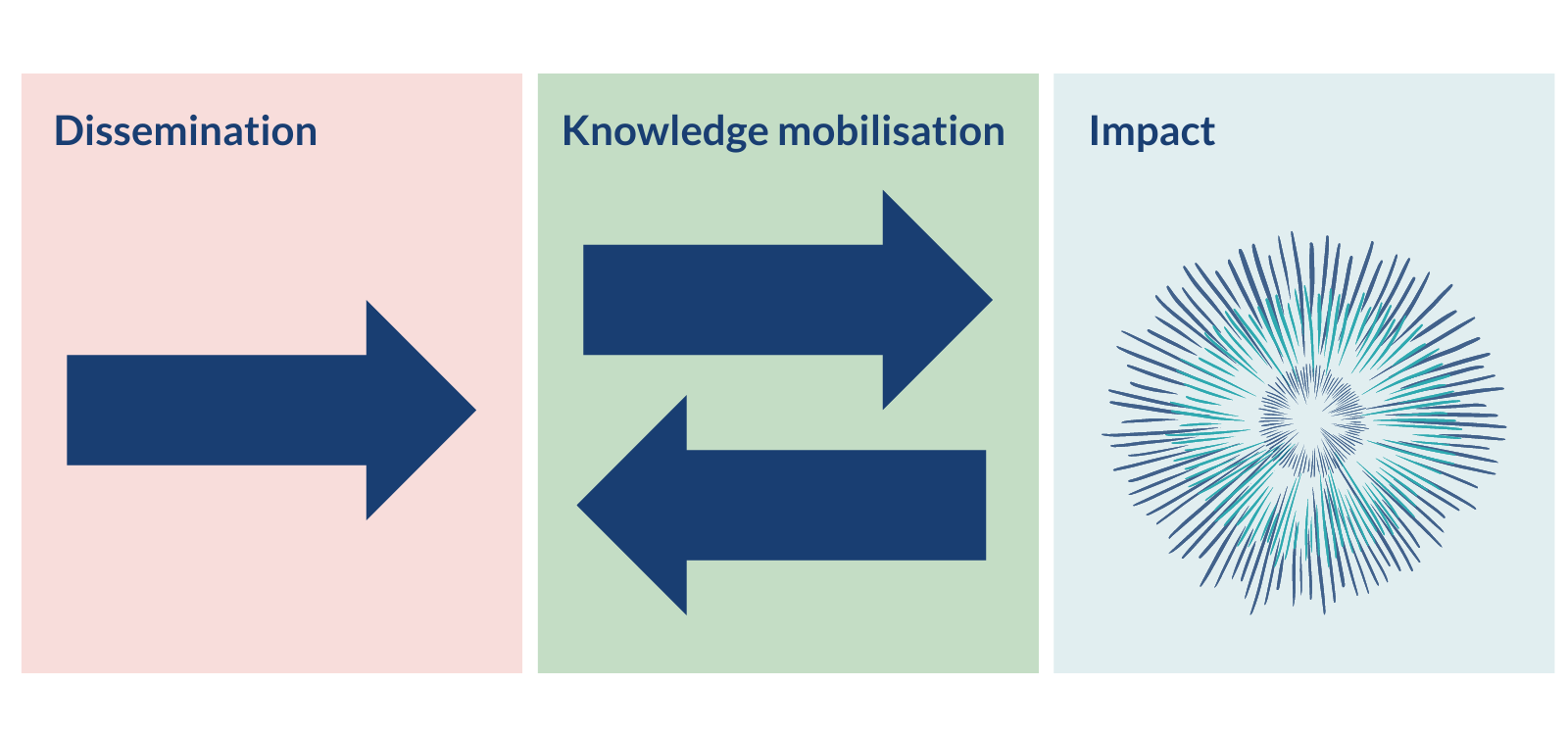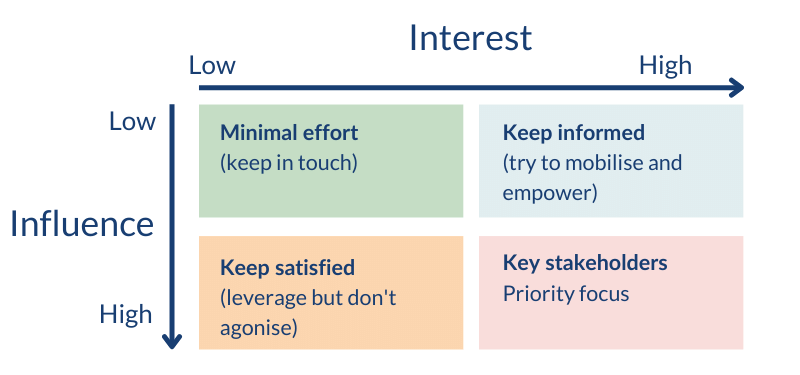Plan knowledge mobilisation

When designing your research, you need to plan how to share it with the people who can use it to effect change. This is known as knowledge mobilisation.
For those interested in Global Health Research, see our planning for impact page.
What is knowledge mobilisation?
Knowledge mobilisation strategies can help researchers share their research with the people who can use it. It is about sharing knowledge between different communities to create new knowledge to catalyse change. Knowledge mobilisation strategies should be integrated throughout your research programme.
Knowledge creation is seen as a process not a product.
It’s also known as knowledge translation, knowledge exchange or knowledge transfer.
Dissemination, knowledge mobilisation and impact

Dissemination
Dissemination is a one-way process where research findings are provided to specific audiences using targeted channels and planned strategies
Knowledge mobilisation
Knowledge mobilisation is more than dissemination. It involves a two-way dialogue between researchers and research users so that knowledge can be shared to create new knowledge to catalyse change.
Impact
Impact describes the contribution of research to the real world.
It is the difference research makes and is the intended outcome of knowledge mobilisation and dissemination.
The term “pathway to impact” refers to planning for impact using the processes of knowledge mobilisation and dissemination.
Why is knowledge mobilisation important?
The research process can take a long time, and when the findings are published they might not be shared with the right people.
Even when research evidence is available, it does not always reach the people who need it such as members of the public, policy makers and health and care professionals.
This can impact the outcomes of people receiving health and care services.
Some research suggests that:
- as little as 14% of findings from clinical trials become standard of care
- up to 40% of patients don't get treated using the best evidence.
Making plans for knowledge mobilisation will ensure your research reaches the people who can improve practice and services.
How can you plan for knowledge mobilisation?
Researchers who apply for funding from NIHR research programmes are expected to include an engagement and impact plan in their application.
You should consider your knowledge mobilisation strategies at the beginning of a research programme.
The people who will use your research or ‘evidence users’ have a key role to play in:
- shaping research priority areas
- designing research questions through consensus and co-production
Consider 3 things to maximise the potential impact of your research at any stage in a research project:
- communities: who is going to use your research?
- context: what are the contextual influences that will affect your research?
- communications: what tools do you have to share your research?
Communities: who is going to use your research?
Prioritise stakeholders to focus your time, energy and resources.
Start by asking yourself:
- who could (or should) be interested in your project?
- how much influence does this person/professional group have over whether this research influences practice?
You can then map out the people and groups you’ve identified on a stakeholder grid plotting interest against influence.

The stakeholders who are high interest and high influence should be your priority, but remember that both interest and influence can change over time. Changes are usually a result of the next thing you should consider, context.
Context: what are the contextual influences that will affect your research?
Contextual influences are the wider factors that might affect your stakeholders and how they interact with your research. These can be:
- political
- environmental
- social
- technological
- legal
- economic.
They might not all be appropriate to your project, and they might change as your project progresses, but it can be worth thinking about the strengths, weaknesses, opportunities and threats presented by each factor.
According to Dr Jenni Lynch, Reader in Social Care, Technology & Knowledge Mobilisation:
“For knowledge mobilisation to work well you want to be a trusted part of the conversation, you want to be helping colleagues to think through the challenges and opportunities”
Communication: what tools do you have to share your research?
From your stakeholder mapping you can see the people you’re trying to reach. For each group, consider whether you can reach them:
- directly - through personal contacts
- indirectly - through an intermediary, for example, a colleague
- by a community - through a professional body, community group, consortium etc.
When communicating with your stakeholders, think about what’s important to your audience and start with that first.
This is usually the implications of your research, rather than information on the background or methods.
You also want to consider which communication method will work best for your audience. Examples include social media, events, briefing papers, conversations. Different audiences will need different approaches.
You need to think about how you:
- reach them
- explain your work
- gather their perspectives.
More information
What are the pros and cons of different creative communication techniques? Learn more in this blog on NIHR Evidence: Creative communication tools can bring research findings to a wider audience.
You can also find other summaries of research that has used knowledge mobilisation approaches in the 'Maximising research impact' section on NIHR Evidence.
Researchers and research funders are striving to make research findings available to everyone. So, how can we do this well? Find out in this blog: Getting the message across: how can we share our research with everyone?
Take a look at this infographic, which sets out some of the key things to consider when communicating your research to patients and the public: 10 recommendations for communicating research to patients and the public
Use a knowledge mobilisation theory, framework or model
Using a knowledge mobilisation framework, theory or model will help you plan your knowledge mobilisation strategy systematically and think about the factors that may influence this, the processes or mechanism of how it may work and your intended outcomes.
You can browse some introductory resources on knowledge mobilisation, these set out some of the theories, models or frameworks of knowledge mobilisation that you can use in your research.
Learn more about knowledge mobilisation
Webinars
You can learn more about knowledge mobilisation in our webinars:
- Introduction to knowledge mobilisation
- Engaging practitioner mindlines: a relational approach to mobilising research knowledge
- Engaging with policy makers: can your research influence policy?
- Mobilising research knowledge with members of the public: the challenges and opportunities
For tips on how to maximise the impact of your research, you can also check out this series of animations.
Guidance
Before you start your funding application, take a look at the 5 most common mistakes made by researchers planning for impact and knowledge mobilisation.
Use the Impact Toolkit on NIHR Learn Open to access a range of tools and resources to support research impact planning, delivery and assessment. This complements our our impact e-learning course.
Some other toolkits that might be helpful include:
- The Canadian Knowledge Mobilisation toolkit– This site has many tools to help researchers plan, carry out and evaluate knowledge mobilisation activities.
- The ESRC impact toolkit– Although for social science research, this site is very good on how to collaborate and influence policymakers. 50 case studies are available.
- The Health Foundation communication toolkit – Excellent resource for understanding communications strategies in general, and the communications strategy template is particularly good.
- The Fast Track toolkit- Includes lots of templates, podcasts, blogs and tools for a variety of impact-related activities.
- Impact Literacy toolkit – Focuses on the first step as identifying the problem in collaboration with research users.
- Introductory resources for Knowledge Mobilisation and planning your pathway to impact - a list of relevant, but not exclusive, knowledge mobilisation and implementation literature.
Fellowships
We need to improve how knowledge is shared and used, particularly in places like the NHS and local authorities. Are you interested in undertaking research to explore the most effective ways to mobilise research? With one of our Fellowships you could also focus on your career development.

"Knowledge mobilisation appealed to me immediately. It is a good fit for anyone who is interested in the Human Factors surrounding research uptake and use, and its impact on society.
"I was thrilled to be awarded an Advanced Fellowship. Advancing my skills in knowledge mobilisation has transferrable applications to help me be more versatile to prospective employers."
Are you working at post-doctoral level and would like to increase your skills in knowledge mobilisation?
